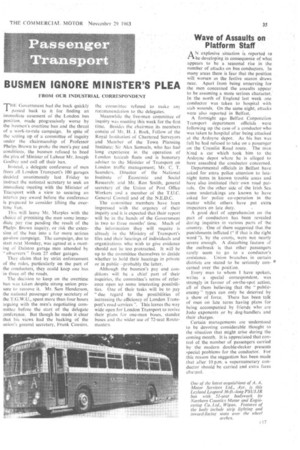BUSMEN IGNORE MINISTER'S PLEA
Page 37

If you've noticed an error in this article please click here to report it so we can fix it.
FROM OUR INDUSTRIAL CORRESPONDENT
THE Ciovernment had the buck quickly passed back to it for finding an immediate easement of the London bus position, made progressively worse by the busmen's overtime ban and the threat of a work-to-rule campaign. In spite of the setting up of a committee of inquiry under the chairmanship of Profess& Phelps Brown to probe the men's pay and conditions, the busmen refused to heed the plea of Minister of Labour Mr. Joseph Godher and call off their ban.
Instead, a delegate conference of men from all London Transport's 100 garages decided unanimously last Friday to instruct the national secretary to seek an immediate meeting with the Minister of Transport with a View to securing an interim pay award before the conference is prepared to consider lifting the overtime ban.
This will leave Mr. Marples with the choice of promising the men some immediate pay rise pending the result of the Phelps Brown inquiry, or risk the extension of the ban into a far more serious go-slow campaign. The campaign, due to start next Monday, was agreed at a meeting of Dalston garage men attended by " observers •' from 27 other garages.
They claim that by strict enforcement of the rules, particularly on the part of the conductors, they could keep one bus in three off the roads. •
The decision to keep on the overtime ban was taken despite strong union pressure to remove it. Mr. Sam Henderson, the national passenger group secretary of the T.G.W.U., spent more than four hours arguing with the men's negotiating committee before the start of the delegate z.onference. But though he made it clear that his views had the backing of the anion..s general secretary, Frank Cousins,
the committee refused to make any recommendation to the delegates.
Meanwhile the five-man committee of inquiry was meeting this week for the first time. Besides the chairman its members consist of Mr. H. Buck, Fellow of the Royal institution of Chartered Surveyors and Member of the Town Planning Institute; Sir Alex Samuels, who has had long experience in the operation of London taxicab fleets and is honorary adviser to the Minister of Transport on London traffic management; Mr. C. T. Saunders. Director of the National Institute of EconOmic and Social Research; and Mr. Ron Smith, general secretary of the Union of Post Office Workers and a member of the T.U.C. Genera! Council and of the N.E.D.C.
The committee members have been impressed with the urgency of their inquiry and it is expected that their report will be in the hands of the Government in two to three months' time. Much of the information they will require is already in the Ministry of Transport's files and their hearings of individuals and organizations who wish to give evidence should not be too protracted. It will be up to the committee themselves to decide whether to hold their hearings in private or in public--probably the latter.
Although the busmen's pay and conditions will be a chief part of their inquiries, the committee's terms of reference open up some interesting possibilities. One of their tasks will be to pay " due regard to the possibilities of increasing the efficiency of London Transport's road services ". This leaves the way wide open for London Transport to revive their plans for one-man buses, standee buses and the wider use of 72-seat Routemasters.








































































































